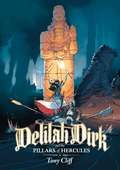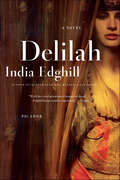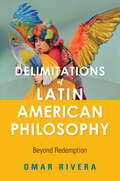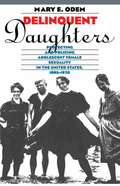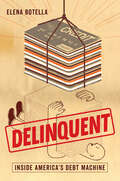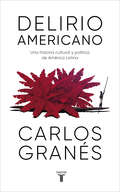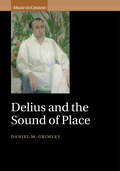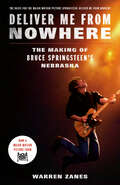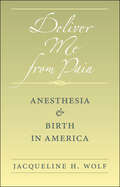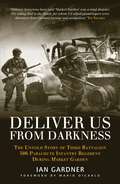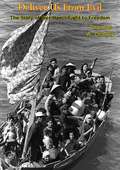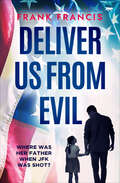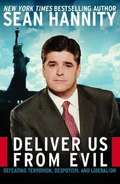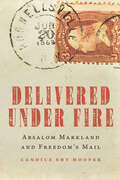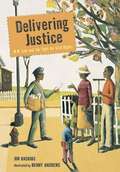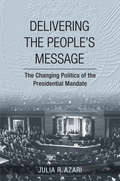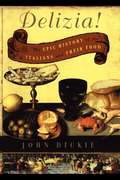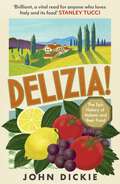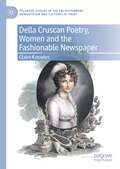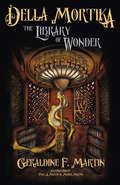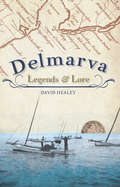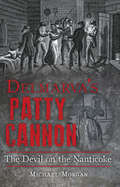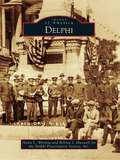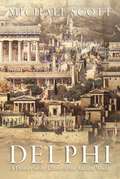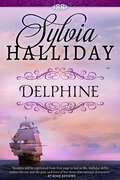- Table View
- List View
Delilah Dirk and the Pillars of Hercules (Delilah Dirk #3)
by Tony CliffHaving survived a close shave in England, where she was falsely accused of spying for the French, Delilah has set out with her companion Selim for more agreeable adventures in central Asia. But when she stumbles on an artifact that may be a clue about the location of the legendary third pillar of Hercules, Delilah and Selim are drawn back to Europe on an Indiana-Jones-style archeological caper that pits her against a ruthless enemy who is murderously intent on preventing Delilah from speaking out against him.From vast forgotten underground cities to an elaborate and shocking double-cross, Tony Cliff's Delilah Dirk and the Pillars of Hercules brings all the drama and excitement that fans of the series crave.
Delilah: A Novel
by India EdghillGiven to the temple of Atargatis as a child, Delilah is raised to be a priestess to the Five Cities that rule Canaan. With her beloved friend Aylah, Delilah grows up under the watchful eyes of high priestess Derceto, who sees the devout young priestesses as valuable playing pieces in her political schemes.In the hills of Canaan, the Israelites chafe under the rule of the Five Cities, and choose Samson to lead them to victory. A reluctant warrior, Samson is a man of great heart who prefers peace to war. But fearing a rebellion, those who rule the Five Cities will do anything to capture Samson. When Samson catches a glimpse of Delilah, he is ready to risk his freedom to marry her, and Derceto seizes the chance to have Samson at her mercy. The Temple's intrigues against Samson force Aylah and Delilah apart, lead Delilah to question her own heart, and change her future forever. A glorious and inventive retelling of an ancient story, Delilah is a soaring tale of political turmoil, searing betrayal, passionate friendship, and forbidden love.
Delimitations of Latin American Philosophy: Beyond Redemption (World Philosophies)
by Omar Rivera“[An] original view of José Carlos Mariátegui’s role in Latin American philosophy and his relation to identity, liberation, and aesthetics (Elizabeth Millán Brusslan, editor of After the Avant-Gardes).In the nineteenth and twentieth centuries, Latin American philosophy focused on the convergence of identity formation and political liberation in ethnically and racially diverse postcolonial contexts. In this book, Omar Rivera interprets how a “we” is articulated and deployed in this robust philosophical tradition. With close readings of Peruvian political theorist José Carlos Mariátegui, he also examines texts by José Martí, Simón Bolívar, and others.Rivera critiques philosophies of liberation that frame the redemption of oppressed identities as a condition for bringing about radical social and political change. Shining a light on Latin America’s complex histories and socialities, he illustrates the power and shortcomings of these projects.Building on this critical approach, Rivera studies interrelated epistemological, transcultural, and aesthetic delimitations of Latin American philosophy in order to explore the possibility of social and political liberation “beyond redemption.”
Delinquent Daughters: Protecting and Policing Adolescent Female Sexuality in the United States, 1885-1920
by Mary E. OdemDelinquent Daughters explores the gender, class, and racial tensions that fueled campaigns to control female sexuality in late nineteenth- and early twentieth-century America. Mary Odem looks at these moral reform movements from a national perspective, explores the local enforcement of regulatory legislation in Alameda and Los Angeles Counties in California and shows that the paradoxical consequences of reform often resulted in coercive and discriminatory policies toward working-class girls.
Delinquent: Inside America's Debt Machine
by Elena BotellaA consumer credit industry insider-turned-outsider explains how banks lure Americans deep into debt, and how to break the cycle. Delinquent takes readers on a journey from Capital One’s headquarters to street corners in Detroit, kitchen tables in Sacramento, and other places where debt affects people's everyday lives. Uncovering the true costs of consumer credit to American families in addition to the benefits, investigative journalist Elena Botella—formerly an industry insider who helped set credit policy at Capital One—reveals the underhanded and often predatory ways that banks induce American borrowers into debt they can’t pay back. Combining Botella’s insights from the banking industry, quantitative data, and research findings as well as personal stories from interviews with indebted families around the country, Delinquent provides a relatable and humane entry into understanding debt. Botella exposes the ways that bank marketing, product design, and customer management strategies exploit our common weaknesses and fantasies in how we think about money, and she also demonstrates why competition between banks has failed to make life better for Americans in debt. Delinquent asks: How can we make credit available to those who need it, responsibly and without causing harm? Looking to the future, Botella presents a thorough and incisive plan for reckoning with and reforming the industry.
Delirio americano: Una historia cultural y política de América Latina
by Carlos GranésDisfruten con la fantasía de los creadores latinoamericanos y observen las nefastas consecuencias del ensueño de los políticos. Y cómo a veces ambos delirios fueron de la mano. Carlos Granés, uno de los pensadores más sólidos y originales de la actualidad, recompone con gran pulso narrativo el inmenso, intrincado y exuberante puzle del largo siglo XX en América Latina. Por primera vez, los lectores pueden recorrer en un mismo relato las etapas, fuerzas y acontecimientos de una historia tradicionalmente contada de manera fragmentaria y profundamente marcada por las complejas relaciones entre cultura y política. El ensayo traza conexiones sorprendentes, muestra reveladoras contradicciones y retrata a figuras como José Martí, César Vallejo, Nahui Olín, Juan Domingo Perón, García Márquez, Doris Salcedo o Caetano Veloso. Desde las primeras reivindicaciones de una América Latina con identidad propia por parte de poetas y ensayistas, el surgimiento del comunismo y el fascismo latinoamericano y la irrupción del populismo hasta la resaca del boom, las nuevas tensiones entre lo local y lo global y la muerte de Fidel Castro en 2016, el libro rastrea el papel de las ideas y las artes en la invención de América Latina y en la construcción de las identidades nacionales durante las dictaduras y revoluciones. Granés da cuenta con brillantez de la influencia del surrealismo, cuyo impacto decisivo fue también político, pues dio lugar a una alternativa individualista, libertaria e imaginativa a las ideologías totalitarias y al populismo que derivaría en la izquierda heterodoxa y en el liberalismo. Delirio americano es un maravilloso fresco, admirablemente narrado, que amplía nuestra mirada sobre un continente cuya historia y destino afectan a las prácticas políticas y culturales de todo Occidente. La crítica ha dicho... «Carlos Granés es en mi opinión uno de los mejores ensayistas de nuestra lengua. Sus libros están escritos en una prosa precisa y flexible, prodigan ideas frescas y son capaces de abrir perspectivas nuevas sobre viejos problemas.» JAVIER CERCAS «Granés es uno de los mejores ensayistas actuales, un escritor brillante y perspicaz».El Confidencial «No creo que nadie haya trazado un fresco tan completo, animado y lúcido sobre todas las vanguardias artísticas del siglo XX. Lo he leído con la felicidad y la excitación con que leo las mejores novelas».Mario Vargas Llosa, sobre El puño invisible «Granés vuelve a dar en el clavo con un ensayo capaz de captar la atención del lector sobre un tema de actualidad y enorme alcance».Forbes, sobre Salvajes de una nueva época «Ameno y riguroso ensayo sobre la liaison de la cultura, el capitalismo y la política».ABC, sobre Salvajes de una nueva época «La política se vuelve vocinglera y el capitalismo vira a lo correcto. Este ensayo pone en limpio lo que parece inconexo».El Mundo, sobre Salvajes de una nueva época
Delius and the Sound of Place (Music in Context)
by Daniel M. GrimleyFew composers have responded as powerfully to place as Frederick Delius (1862–1934). Born in Yorkshire, Delius resided in the United States, Germany, and Scandinavia before settling in France, where he spent the majority of his professional career. This book examines the role of place in selected works, including 'On Hearing the First Cuckoo in Spring', Appalachia, and The Song of the High Hills, reading place as a creative and historically mediated category in his music. Drawing on archival sources, contemporary art, and literature, and more recent writing in cultural geography and the philosophy of place, this is a new interpretation of Delius' work, and he emerges as one of the most original and compelling voices in early twentieth-century music. As the popularity of his music grows, this book challenges the idea of Delius as a large-scale rhapsodic composer, and reveals a richer and more productive relationship between place and music.
Deliver Me from Nowhere: The Making of Bruce Springsteen's Nebraska
by Warren ZanesThe fascinating story behind the making of Bruce Springsteen&’s most surprising album, Nebraska, revealing its pivotal role in Springsteen&’s career—now with a new afterwordSoon to be a major motion picture starring Jeremy Allen White (The Bear)&“Brilliant . . . For fans of American music, Deliver Me from Nowhere makes a great ghost story.&”—The Boston GlobeAN NPR BEST BOOK OF THE YEARWithout Nebraska, Bruce Springsteen might not be who he is today. The natural follow-up to Springsteen&’s hugely successful album The River should have been the hit-packed Born in the U.S.A. But instead, in 1982, he came out with an album consisting of a series of dark songs he had recorded by himself, for himself. But more than forty years later, Nebraska is arguably Springsteen&’s most important record—the lasting clue to understanding not just his career as an artist and the vision behind it, but also the man himself.Nebraska is rough and unfinished, recorded on cassette tape with a simple four-track recorder by Springsteen, alone in his bedroom, just as the digital future was announcing itself. And yet Springsteen now considers it his best album. Nebraska expressed a turmoil that was reflective of the mood of the country, but it was also a symptom of trouble in the artist&’s life, the beginnings of a mental breakdown that Springsteen would only talk about openly decades after the album&’s release.Warren Zanes spoke to many people involved with making Nebraska, including Bruce Springsteen himself. He also interviewed more than a dozen celebrated artists and musical insiders, from Rosanne Cash to Steven Van Zandt, about their reactions to the album. Zanes interweaves these conversations with inquiries into the myriad cultural touchpoints, including Terrence Malick&’s Badlands and the short stories of Flannery O&’Conner, that influenced Springsteen as he was writing the album&’s haunting songs. The result is a textured and revelatory account of not only a crucial moment in the career of an icon but also a record that upended all expectations and predicted a home-recording revolution.
Deliver Me from Pain: Anesthesia and Birth in America
by Jacqueline H. WolfDespite today's historically low maternal and infant mortality rates in the United States, labor continues to evoke fear among American women. Rather than embrace the natural childbirth methods promoted in the 1970s, most women welcome epidural anesthesia and even Cesarean deliveries. In Deliver Me from Pain, Jacqueline H. Wolf asks how a treatment such as obstetric anesthesia, even when it historically posed serious risk to mothers and newborns, paradoxically came to assuage women's anxiety about birth.Each chapter begins with the story of a birth, dramatically illustrating the unique practices of the era being examined. Deliver Me from Pain covers the development and use of anesthesia from ether and chloroform in the mid-nineteenth century; to amnesiacs, barbiturates, narcotics, opioids, tranquilizers, saddle blocks, spinals, and gas during the mid-twentieth century; to epidural anesthesia today.Labor pain is not merely a physiological response, but a phenomenon that mothers and physicians perceive through a historical, social, and cultural lens. Wolf examines these influences and argues that medical and lay views of labor pain and the concomitant acceptance of obstetric anesthesia have had a ripple effect, creating the conditions for acceptance of other, often unnecessary, and sometimes risky obstetric treatments: forceps, the chemical induction and augmentation of labor, episiotomy, electronic fetal monitoring, and Cesarean section.As American women make decisions about anesthesia today, Deliver Me from Pain offers them insight into how women made this choice in the past and why each generation of mothers has made dramatically different decisions.
Deliver Us From Darkness
by Ian GardnerIan Gardner, co-author of Tonight We Die as Men, is back with the second installment of the exploits of the 3/506 in WWII. Drawing on years of research and more than seventy extended interviews with veterans and civilians caught up in the fighting, Deliver Us from Darkness begins where the earlier book ended, with the troops taking R&R back in England after weeks of grueling fighting in Normandy. Deliver Us from Darkness explains how, with little notice on Sept 17, 1944, the 101st Airborne Division parachuted into Holland as part of Operation Market Garden. Their mission was to secure the main highway that passed through the city of Eindhoven and facilitate the advance of Gen. Sir Miles Dempsey's Second British Army towards Arnhem. The soldiers had been lead to believe that after the capture of Eindhoven their mission would be over. In the end, however, it was only the beginning of a bloody 72-day campaign that would see no quarter given by either side. Thousands of heavily armed enemy troops trapped behind Allied lines were reorganized into temporary fighting groups and sent on the offensive. Supported by Tiger tanks and self propelled artillery, the German army began an audacious series of counter attacks along the road to Nijmegen that became known as 'Hell's Highway.' Over the next two weeks the 506th was constantly called upon to defend the transport hubs north of Eindhoven at Sint Oedenrode, Veghel and Uden suffering horrendous casualties. The mission in Holland would be one that the men would never forget. Many felt that their lives had been misused and wasted--Normandy had been bad enough, but this time the members of 3/506 had been through hell.
Deliver Us From Evil: The Story of Viet Nam’s Fight to Freedom
by Thomas A. DooleyThe young American who became a living legend to the world tells how as a navy doctor he helped half a million Vietnamese refugees escape from communist terror…This is the true, first-hand narrative of a twenty-seven-year-old Navy Doctor who found himself suddenly ordered to Indo-China, just after the tragic fall of Dien Bien Phu. In a small international compound within the totally Communist-consumed North Viet Nam, he built huge refugee camps to care for the hundreds of thousands of escapees seeking passage to freedom. Through his own ingenuity and that of his shipmates, and with touching humor, he managed to feed, clothe, and treat these leftovers of an eight-year war. Dr. Dooley “processed” over 600,000 refugees down the river and out to sea on small craft, where they were transferred to U.S. Navy ships to be carried to the free areas of Saigon.The “Bac Sy My,” as they called the American doctor, explains how he conquered the barriers of custom, language and hate to become, as the President of Viet Nam said of him, “Beloved by a whole nation.”
Deliver Us from Evil: A brand new mind-blowing historical mystery thriller
by Frank FrancisA woman searches desperately for the truth about the JFK assassination—and about her father&’s possible role in it . . . Maureen Finn is at a White House ceremony honoring the memory of her father, Sean. Robert Novak is in New York, watching the event on TV—his gaze fixed on Maureen. Soon afterward, Novak approaches Maureen and hands her a photo of her dad in the company of Lee Harvey Oswald. When he tells her that her father was involved in the Kennedy assassination—and asks her to lend her professional skills to his investigation—she&’s horrified and angry. But when she questions her mother, her suspicions only increase, and after further research she learns that her dad did some work for the CIA. Now she and Novak are being tracked—and as they travel from country to country looking for answers, will shocking truth they uncover ever see the light of day?
Deliver Us from Evil: Defeating Terrorism, Despotism, and Liberalism
by Sean HannityNearly three years have passed since that tragic day in September. Since then, our wounds have healed, but our senses and memories have dulled. At first, the nation rallied behind its leader. But by the time the confrontation with Iraq presented itself, our courage and moral certainty seemed to fade in the face of partisan bickering and posturing. Now the political left and the Democratic Party are trying to use the demanding aftermath of the war to exploit our national cause for their own political advantage. How could we allow ourselves to forget so soon? --from Deliver Us from Evil Sean Hannity's first blockbuster book, the New York Times bestseller Let Freedom Ring, cemented his place as the freshest and most compelling conservative voice in the country. As the host of the phenomenally successful Hannity & Colmes on the Fox News Channel and The Sean Hannity Show on ABC Radio, Hannity has won a wildly devoted fan base. Now he brings his plainspoken, take-no-prisoners style to the continuing War on Terror abroad -- and liberalism at home -- in Deliver Us from Evil. "Evil exists," Hannity asserts. "It is real, and it means to harm us." And in these pages he revisits the harsh lessons America has learned in confronting evil in the past and the present, to illuminate the course we must take in the future. Tracing a direct line from Adolf Hitler and Joseph Stalin through Saddam Hussein and Osama bin Laden, he reminds us of the courage and moral clarity of our great leaders. And he reveals how the disgraceful history of appeasement has reached forward from the days of Neville Chamberlain and Jimmy Carter to corrupt the unrepentant leftists of the modern Democratic Party -- from Howard Dean and John Kerry to Bill and Hillary Clinton. As Americans face the ongoing war against terrorists and their state sponsors around the world, Sean Hannity reminds us that we must also cope with the continuing scourge of accommodation and cowardice at home. With his trademark blend of passion and hard-hitting commentary, he urges Americans to recognize the dangers of putting our faith in toothless "multilateralism" when the times call for decisive action. For only through strong defense of our freedoms, at home and around the world, can we preserve America's security and liberty in the dangerous twenty-first century.
Delivered Under Fire: Absalom Markland and Freedom's Mail
by Candice Shy HooperDuring the Civil War his movements from battlefield to battlefield were followed in the North and in the South nearly as closely as those of generals, though he was not in the military. After the war, his swift response to Ku Klux Klan violence sparked passage of a landmark civil rights law, though he was not a politician. When he died in 1888 newspapers reported his death from coast to coast, yet he&’s unknown today. He was the man who delivered the most valuable ingredient in U.S. soldiers&’ fighting spirit during those terrible war years—letters between the front lines and the home front. He was Absalom Markland, special agent of the United States Post Office, and this is his first biography. At the beginning of the Civil War, at the request of his childhood friend Ulysses S. Grant, Markland created the most efficient military mail system ever devised, and Grant gave him the honorary title of colonel. He met regularly with President Abraham Lincoln during the war and carried important messages between Lincoln and Generals Grant and William Tecumseh Sherman at crucial points in our nation&’s peril. When the Ku Klux Klan waged its reign of terror and intimidation after the Civil War, Markland&’s decisive action secured the executive powers President Grant needed to combat the Klan. Nearly every biography of Lincoln, Sherman, and Grant includes at least one footnote about Markland, but his important, sometimes daily interaction with them during and after the war has escaped modern notice, until now. Absalom Markland is a forgotten American hero. Delivered Under Fire tells his amazing story.
Delivering Justice: W. W. Law and the Fight for Civil Rights
by Jim HaskinsA respected biographer teams up with an acclaimed artist to tell the story of the mail carrier who orchestrated the Great Savannah Boycott -- and was instrumental in bringing equality to his community. "Grow up and be somebody," Westley Wallace Law's grandmother encouraged him as a young boy living in poverty in segregated Savannah, Georgia. Determined to make a difference in his community, W.W. Law assisted blacks in registering to vote, joined the NAACP and trained protesters in the use of nonviolent civil disobedience, and, in 1961, led the Great Savannah Boycott. In that famous protest, blacks refused to shop in downtown Savannah. When city leaders finally agreed to declare all of its citizens equal, Savannah became the first city in the south to end racial discrimination. A lifelong mail carrier for the U.S. Postal Service, W.W. Law saw fostering communication between blacks and whites as a fundamental part of his job. As this affecting biography makes clear, this "unsung hero" delivered far more than the mail to the citizens of the city he loved.
Delivering the People’s Message: The Changing Politics of the Presidential Mandate
by Julia R. AzariPresidents have long invoked electoral mandates to justify the use of executive power. In Delivering the People’s Message, Julia R. Azari draws on an original dataset of more than 1,500 presidential communications, as well as primary documents from six presidential libraries, to systematically examine choices made by presidents ranging from Herbert Hoover in 1928 to Barack Obama during his 2008 election. Azari argues that Ronald Reagan’s election in 1980 marked a shift from the modern presidency formed by Franklin Delano Roosevelt to what she identifies as a more partisan era for the presidency. This partisan model is a form of governance in which the president appears to require a popular mandate in order to manage unruly and deeply contrary elements within his own party and succeed in the face of staunch resistance from the opposition party.Azari finds that when the presidency enjoys high public esteem and party polarization is low, mandate rhetoric is less frequent and employs broad themes. By contrast, presidents turn to mandate rhetoric when the office loses legitimacy, as in the wake of Watergate and Vietnam and during periods of intense polarization. In the twenty-first century, these two factors have converged. As a result, presidents rely on mandate rhetoric to defend their choices to supporters and critics alike, simultaneously creating unrealistic expectations about the electoral promises they will be able to fulfill.
Delizia!: The Epic History of the Italians and Their Food
by John DickieBuon appetito! Everyone loves Italian food. But how did the Italians come to eat so well? The answer lies amid the vibrant beauty of Italy's historic cities. For a thousand years, they have been magnets for everything that makes for great eating: ingredients, talent, money, and power. Italian food is city food. From the bustle of medieval Milan's marketplace to the banqueting halls of Renaissance Ferrara; from street stalls in the putrid alleyways of nineteenth-century Naples to the noisy trattorie of postwar Rome: in rich slices of urban life, historian and master storyteller John Dickie shows how taste, creativity, and civic pride blended with princely arrogance, political violence, and dark intrigue to create the world's favorite cuisine. Delizia! is much more than a history of Italian food. It is a history of Italy told through the flavors and character of its cities. A dynamic chronicle that is full of surprises, Delizia! draws back the curtain on much that was unknown about Italian food and exposes the long-held canards. It interprets the ancient Arabic map that tells of pasta's true origins, and shows that Marco Polo did not introduce spaghetti to the Italians, as is often thought, but did have a big influence on making pasta a part of the American diet. It seeks out the medieval recipes that reveal Italy's long love affair with exotic spices, and introduces the great Renaissance cookery writer who plotted to murder the Pope even as he detailed the aphrodisiac qualities of his ingredients. It moves from the opulent theater of a Renaissance wedding banquet, with its gargantuan ten-course menu comprising hundreds of separate dishes, to the thin soups and bland polentas that would eventually force millions to emigrate to the New World. It shows how early pizzas were disgusting and why Mussolini championed risotto. Most important, it explains the origins and growth of the world's greatest urban food culture. With its delectable mix of vivid storytelling, groundbreaking research, and shrewd analysis, Delizia! is as appetizing as the dishes it describes. This passionate account of Italy's civilization of the table will satisfy foodies, history buffs, Italophiles, travelers, students -- and anyone who loves a well-told tale.
Delizia: The Epic History of Italians and Their Food
by John Dickie'If only we could all write as brilliantly on Italy and its food as John Dickie does. He may well know Italy and Italians better than they know themselves' Stanley TucciThe new edition of the much-loved classic, with a fresh chapter that brings the surprising and moreish tale of the Italian way of eating right up to the present.Delizia! takes the reader on a revelatory historical journey through the flavours of the cities that shaped the Italian love for good eating. From the bustle of Medieval Milan, to the bombast of Fascist Rome; from the pleasure gardens of Renaissance Ferrara, to the putrid alleyways of nineteenth-century Naples. In rich slices of Italian life, Delizia! shows how violence and intrigue, as well as taste and creativity, went to make the world's favourite cuisine. With its mix of vivid story-telling, ground-breaking research and shrewd analysis, John Dickie's Delizia! is as appetising as the dishes it describes.
Della Cruscan Poetry, Women and the Fashionable Newspaper (Palgrave Studies in the Enlightenment, Romanticism and Cultures of Print)
by Claire KnowlesThis book explores Della Cruscan poetry in the late eighteenth-century literary scene. A sociable, ornate, and deeply theatrical type of poetry, Della Cruscanism was associated with writers like Robert Merry, Mary Robinson, and Hannah Cowley. While Merry is the poet most commonly associated with the Della Cruscan school, this book argues that Della Cruscanism was a movement dominated by female poets and that this was one of the key reasons for the later disavowal and downgrading of its poetic accomplishments. It offers a close examination of these women writers and their role in shaping the poetic culture of the fashionable newspaper. In doing so, this study offers the first account of the feminization of the fashionable newspaper and of popular literary culture in the final years of the eighteenth century.
Della Mortika 2: The Library of Wonder
by Geraldine F. Martin Marisa Martin Paul J. MartinAbigail and Beatrix have been adopted by the Malefics, a famous inventor family, after a short stay in the Skipping girl Home for Wayward and Homeless girls in Melbourne. Zarah sets out to be reunited with them, but when she gets to the Malefic Mansion she is disturbed to find that her sisters are nowhere to be seen. Where are Zarah's sisters? Why have other children been disappearing? And what do these happenings have to do with the Malefics' latest invention, The Library of Wonder?
Delmarva Legends & Lore (American Legends)
by David HealeyBetween the waters of the Atlantic and the Chesapeake is Delmarva, a storied land that was once the hunting ground of Blackbeard, where ancient sea monsters lurk and wild ponies gallop along the beaches. Local author David Healey explores the lore of Delmarva, from the legends of St. Michaels--the town that escaped British cannons with a clever trick--to stories of Assateague's cannibalistic colonists and the all but forgotten history of Anna Carroll, President Lincoln's "Dear Lady," who is rumored to have brilliantly advised him on strategy during the Civil War. Join Healey as he reveals the secret history and remarkable legends of Delmarva.
Delmarva's Patty Cannon: The Devil on the Nanticoke (True Crime Ser.)
by Michael Morgan&“Details the brazen robberies, shameless kidnappings and heartless murders committed by Delmarva&’s legendary criminal.&”—Cape Gazette Truth lies behind the grim legend of Patty Cannon. In the early nineteenth century, Patty and her gang terrorized the Delmarva Peninsula, kidnapping free African American men, women and children. Using surprise and treachery, Cannon even employed a free African American accomplice to lure her unsuspecting prey. Captives who survived confinement in Patty&’s cells were sold south. The position of the Cannon home on the shadowy border between Delaware and Maryland allowed her to dodge the law until a local farmer unearthed the remains of her victims in 1829. Patty mysteriously died in jail awaiting trial. Author Michael Morgan investigates the chilling history of one of the nation&’s first serial killers.
Delphi (Images of America)
by Bonnie J. Maxwell Delphi Preservation Society, Inc. Anita L. WerlingDelphi is nestled in the picturesque valley formed by the Wabash River and Deer Creek. Named for the Grecian city with its famed oracle, Delphi was envisioned by early residents as a center of culture for the surrounding area. Three courthouses have graced the central square in Delphi--the "seat of justice" in Carroll County since platted in 1828 by Gen. Samuel Milroy. When the Wabash and Erie Canal cut through the area in the 1840s, Delphi became a center for industry and commerce. Handsome three-story brick buildings appeared in the 1850s and surrounded the square by the 1880s. Area residents traveled to Delphi for trade, business, and entertainment. Delphi's opera houses drew traveling acts from Chicago, Indianapolis, Cincinnati, and other cultural centers. Visitors today enjoy the architectural gems downtown and in nearby residential districts plus six parks with miles of groomed hiking and biking trails. The canal era is alive in Delphi at the Wabash and Erie Canal Interpretive Center where a replica boat takes visitors on a restored section of the historic waterway.
Delphi: A History of the Center of the Ancient World
by Michael ScottA comprehensive narrative history of the ancient world's center, from its founding to its modern rediscoveryThe oracle and sanctuary of the Greek god Apollo at Delphi were known as the "omphalos"—the "center" or "navel"—of the ancient world for more than 1,000 years. Individuals, city leaders, and kings came from all over the Mediterranean and beyond to consult Delphi's oracular priestess; to set up monuments to the gods; and to take part in competitions.In this richly illustrated account, Michael Scott covers the history and nature of Delphi, from the literary and archaeological evidence surrounding the site, to its rise as a center of worship, to the constant appeal of the oracle despite her cryptic prophecies. He describes how Delphi became a contested sacred site for Greeks and Romans and a storehouse for the treasures of rival city-states and foreign kings. He also examines the eventual decline of the site and how its meaning and importance have continued to be reshaped.A unique window into the center of the ancient world, Delphi will appeal to general readers, tourists, students, and specialists.
Delphine: The French Maiden Series - Book Three
by Sylvia Halliday"Sylvia Halliday spins a marvelous tale." —RT BOOK REVIEWS Unable to deny the attraction that simmers between them on the long journey from Canada to France, Delphine, a wild hoyden and the captain's daughter, and Andre, a widower still mourning his lost wife, fall into one another's arms on the last day of the voyage. But after an impassioned night, morning comes, the ship has docked, Delphine wakes alone, and Andre has fled. Scorned, Delphine soon finds herself determined to avenge her broken heart. But a love that will not be denied may confound her journey to Andre's ruin.
